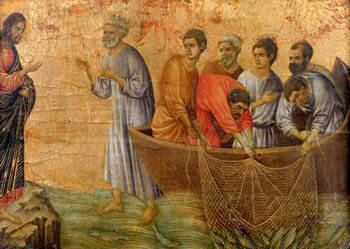This post is based on a reflection I delivered Friday, October 4th, 2013 to educators from Jesuit high schools in Arizona and southern California. The theme of the talk was "The Vocation of the Ignatian Educator." It has been condensed and adapted for publication.
Though I've just entered my fourteenth year in Jesuit education (eight as a student, five as a faculty member), I'm still, at times, overwhelmed by all the mottos and standards that govern our way of proceeding.
We start, of course, with "A.M.D.G." and with the invitation to undertake all ad majorem dei gloriam, "for the greater glory of God." Clear enough, I think. But at about the time I think I got a handle on A.M.D.G., I remember that Jesuit education also connects with the principle of cura personalis, the "care of the whole person," which requires a constant watchfulness over the spiritual, academic, athletic, and emotional health of our students. This entails a more specific mission in light of another set of standards: the Graduate at Graduation or, as we call them in our schools, the "Grad at Grad."
So I try to figure out the connection between "A.M.D.G.," cura personalis, and the Grad at Grad, but then someone comes along to remind me of the Ignatian emphasis on magis, the Latin for "more," and I remember that faculty and students are encouraged to seek an ever increasing depth in everything they do. But the concept of magis needs to reflect, come to find out, the "Profile of the Ignatian Educator," which is kind of like the Grad at Grad but for faculty.
Okay, I think: A.M.D.G., cura personalis, the Grad at Grad, magis, and the "Profile of the Ignatian Educator." I got it, or . . . wait . . . what about Jesuit education having to form "men and women with and for others"? Does formation with and for others, I wonder, result from focusing on the Grad at Grad? Vice versa?
And what about Ignatian spirituality? Isn't Ignatian spirituality, which infuses Jesuit education, about "finding God in all things"? And isn't the road to that through the Spiritual Exercises, which depends upon the First Principle and Foundation, which . . .
Now let me clarify: I love these guidelines and appreciate the stability they provide. Amazingly, they work. Each has its role; each has a helpful application, and if you spend enough time teaching in Jesuit schools, you'll soon find yourself, like how you learned your native language, simply knowing which principle goes where, which concept illuminates which situation.
But on my worst days, on those days when I doubt my teaching, I treat the standards and principles as a Rubik's cube. They're something I want to color code and solve. Surely, I think, there must be an equation or technique to make them all fit together, to make it clear that I'm doing it the right way. Surely there must be some way to align all the principles into one squared and colored-coded symbol, perfectly compartmentalized and unchanging.
In these moments of feeling daunted, it brings me tremendous comfort -- consolation, you might say -- to know that all of this began with something very personal and humble, with a wounded and thwarted soldier. Before the Society of Jesus, before the dozens of institutions that now bear the name Loyola, before the hundreds of ministries that now share the Ignatian charism, there was a wounded man with a broken leg and shattered dreams. There was a man filled with defeat, uncertainty, vulnerability, and sorrow. But a man, nevertheless, with an extraordinary capacity to reflect, to discern, and to abandon himself to faith. Ignatius, you will recall, had no idea what he was getting himself into when he left the Loyola castle. Sure, he had plans for Jerusalem, but those were short-lived, and soon he found himself back in Spain, learning Latin with schoolchildren. He could not possibly have forecasted or planned the developments that would lead to the Society of Jesus. His only certainty was uncertainty.
Ignatius's example tells us, then, about how to approach our work as educators, particularly how to approach all the standards and mottos that govern it. Following Ignatius, we know that excellence in our vocation will not result from finding the perfect relationship of phrases. Our vocation doesn't even start with our desire to be teachers. Our vocation to education, rather, starts with our vocation to God. It starts with our own willingness to wake up each day and, like Ignatius, commit to mystery; to wake up each day and pledge ourselves to following Christ, without condition and without guarantee.
The effect for us is something much different than the effort to solve a Rubik's cube. And the image I want to leave you with, the image that I think captures all the frameworks and guidelines, is one of my favorites from the New Testament. It comes in the Gospel of Luke, Chapter 5:
When [Jesus] had finished speaking, he said to Simon, "Put out into the deep water and let down your nets for a catch." Simon answered, "Master, we have worked all night long but have caught nothing. Yet if you say so, I will let down the nets." When they had done this, they caught so many fish that their nets were beginning to break. So they signaled their partners in the other boat to come and help them. And they came and filled both boats . . ."
Not the solving of a puzzle, but a putting out into the deep. That is our vocation. Let us be led into those waters.








